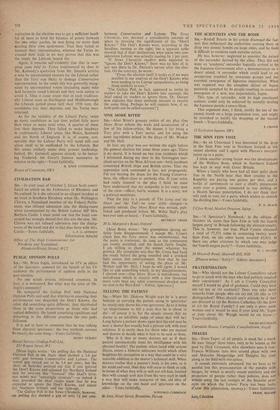PUBLIC OPINION POLLS SIR,—Mr. Brian Inglis, introduced on ITV as
editor of the Spectator, assessed for the benefit of his TV audience the performance of opinion polls in the past election.
No one minds serious, informed comment. In fact, it is welcomed. But what was the level of Mr. Inglis's comment?
He compared the Gallup Poll with National Opinion Polls and said that whereas in assessing their performance one discarded the Don't Knows, the other did something quite different, they distributed them in the same proportions as those who had replied definitely. He found something significant and disturbing in the different practices the two polls followed.
It is sad to have to comment that he was talking from abysmal ignorance : the two methods amount to exactly the same thing.—Yours faithfully, 211 Regent Street, WI [Brian Inglis writes : 'On polling day the National Opinion Poll in the Daily Mail showed a 3.6 per cent. gap between Conservative and Labour. The actual gap turned out to be 5.4 per cent.; but the Mail on Saturday pointed out that if you ignored the Don't Knows and adjusted for Northern Ireland and for turn-out this "forecast" (the Mail's term. not mine) was "amazingly accurate"—as indeed it was, provided the Mail reader knew that he was expected to ignore the Don't Knows, and adjust for Northern Ireland, and for turn-out.
'The Gallup Poll in the News Chronicle, however, .on polling day showed a gap of only If per cent. between Conservative and Labour. The News Chronicle, too, devoted a considerable amount of space to stressing the significance of the "Don't Knows." The Don't Knows were, according to the headline, turning to the right; but a separate table showed that if their inclinations were taken into con- sideration Labour was actually leading by 1 per cent.
'If News Chronicle readers were expected to "ignore the Don't Knows," there was no hint of it; nor was there in Dr. Durant's survey after the elec- tion. On the contrary, he wrote: "From the election itself it looks as if we were justified in our analysis of the Don't Knows who were tending to be Labour sympathisers, as being those unlikely to vote." 'The Gallup Poll, in fact, appeared to invite its readers to take the Don't Knows into account; the Mail asked its readers to ignore them. Dr. Durant now explains that these methods amount to exactly the same thing. Perhaps he will explain how, if so, both polls can be called accurate?']






































 Previous page
Previous page